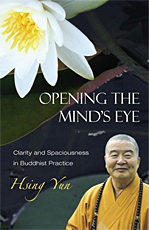Venerable Master Hsing Yun is the founder of Fo Guang Shan, an order of Buddhists dedicated to the promotion of "Humanistic Buddhism," which seeks to make Buddhism useful and relevant to today's spiritual seekers. The author has written many books including Living Affinity. In this edifying work, Master Hsing Yun presents practices and perspectives that can clear the mind and enable us to see the world and ourselves with clarity and joy. He outlines five types of erroneous views (delusions about the body, biased views, corrupt lies, egotistical views, and views that misuse precepts) which can cloud our vision.
Concerning gratitude for each day, Yun writes: "I look at trees and flowers; they were my Dharma companions. No one could deprive me of so many Dharma companions. I walked across rivers and plains, which offered limitless Dharma delight. No one could take that away from me or tell me I didn't have enough money. My Dharma joy was so fulfilling. If our minds are broad and open, we are freely given heaven and earth, the sun and the moon; they are all ours. We can have all time and space. In fact, we already do, and we simply must wake up to this truth. If all we can do is complain and get depressed about poverty and obstacles, you will be poor and ill at ease in all places and at all times. Your time and space will be an endless hell and a boundless sea of suffering."
Everything changes, so there is little sense in clinging to things. Impermanence is the name of the game. Master Hsing Yun points out that all the changes in our bodies (there is not a single cell that does not change over the course of seven years), our relationships, and the roll of the seasons are all examples of the wheel of rebirth. Since we have so little time here, it is best spent cultivating favorable conditions. The author does a fine job describing this Buddhist practice of creating plenty of good conditions for the happiness of others. It can be done in a variety of ways including kind encouragement, meritorious deeds, educating others, and offering a helping hand or a warm gesture. We also appreciated the section by Master Hsing Yun on the ways in which lives can be changed by a person, a thought, an event, or even a word. Destiny is not fixed; we can make a difference in the life of another by any of these means.
